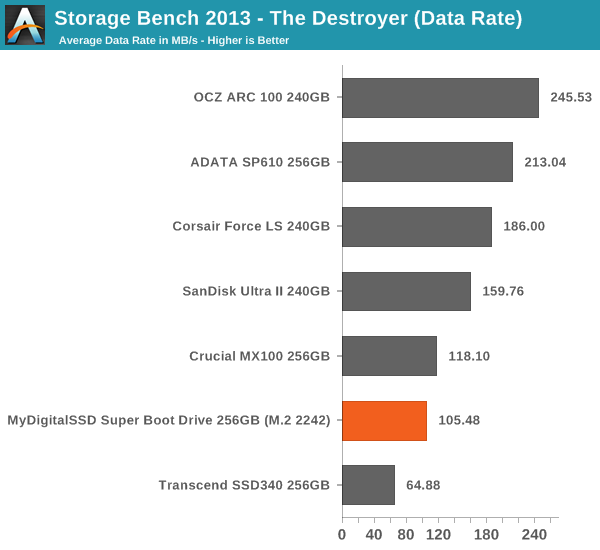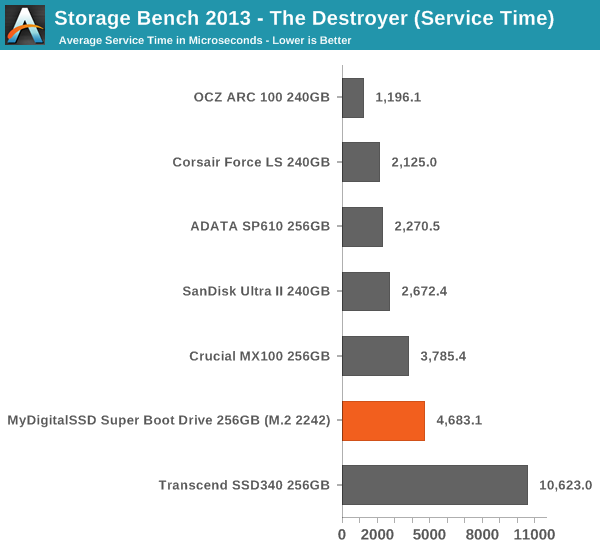Upgrading the SSD in Chromebook & MyDigitalSSD Super Boot Drive M.2 2242 SSD Review
by Kristian Vättö on October 21, 2014 8:00 AM ESTAnandTech Storage Bench 2013
Our Storage Bench 2013 focuses on worst-case multitasking and IO consistency. Similar to our earlier Storage Benches, the test is still application trace based – we record all IO requests made to a test system and play them back on the drive we are testing and run statistical analysis on the drive's responses. There are 49.8 million IO operations in total with 1583.0GB of reads and 875.6GB of writes. I'm not including the full description of the test for better readability, so make sure to read our Storage Bench 2013 introduction for the full details.
| AnandTech Storage Bench 2013 - The Destroyer | ||
| Workload | Description | Applications Used |
| Photo Sync/Editing | Import images, edit, export | Adobe Photoshop CS6, Adobe Lightroom 4, Dropbox |
| Gaming | Download/install games, play games | Steam, Deus Ex, Skyrim, StarCraft 2, BioShock Infinite |
| Virtualization | Run/manage VM, use general apps inside VM | VirtualBox |
| General Productivity | Browse the web, manage local email, copy files, encrypt/decrypt files, backup system, download content, virus/malware scan | Chrome, IE10, Outlook, Windows 8, AxCrypt, uTorrent, Ad-Aware |
| Video Playback | Copy and watch movies | Windows 8 |
| Application Development | Compile projects, check out code, download code samples | Visual Studio 2012 |
We are reporting two primary metrics with the Destroyer: average data rate in MB/s and average service time in microseconds. The former gives you an idea of the throughput of the drive during the time that it was running the test workload. This can be a very good indication of overall performance. What average data rate doesn't do a good job of is taking into account response time of very bursty (read: high queue depth) IO. By reporting average service time we heavily weigh latency for queued IOs. You'll note that this is a metric we have been reporting in our enterprise benchmarks for a while now. With the client tests maturing, the time was right for a little convergence.

The Super Boot Drive actually does surprisingly well in our 2013 suite given that it is an M.2 2242 design while the other SSDs in the comparison are 2.5". The M.2 2242 form factor does not allow for a separate DRAM cache and limits the drive to just two channels, leaving half the channels unpopulated and thus reducing maximum performance.











67 Comments
View All Comments
nevertell - Tuesday, October 21, 2014 - link
Could you do a review with putting Arch Linux or any other linux distribution and see how well that would fare on a cheap notebook such as this ?Nvidia is claiming to provide proper drivers for their tegra k1 this time around and it might be interesting to see how well a 'desktop' OS would fare on an arm chromebook.
kpb321 - Tuesday, October 21, 2014 - link
I agree. Putting more storage in a Chromebook doesn't make sense for exactly what the article found. The Chrome OS isn't designed around using local storage. Generally, you can't install windows on these machines because their bios doesn't support everything windows needs but ChrUbuntu or Crouton are designed to installed linux on this type of machine and a larger SSD might actually be useful then.danjw - Tuesday, October 21, 2014 - link
For any future M.2 drive reviews, I would suggest you include in the specs grid what the keying is SATA, PCIE or both.BackInAction - Tuesday, October 21, 2014 - link
"Chromebooks are generally the cheapest laptops around, yet if you buy a Windows laptop that costs twice as much you will most likely end up with a traditional hard drive for storage. That is an enormous benefit that Chromebooks have because the lack of a hard drive enables much thinner and lighter designs, which translates into a better user experience."While I believe "better/thinner/lighter" inexpensive windows devices are on their way. This is one of the top benefits of CB over $300 Win laptop. That and the fact that I have no worries about AV and/or software updates.
I own an 2nd gen i3 Win7 desktop, 2nd gen i3 Win7 laptop and a chromebook (Toshiba 13). Until I swapped out the HD on the laptop with a $50 SSD, it was nearly worthless. That said it is still a "tank" compared to the chromebook.
andrewaggb - Tuesday, October 21, 2014 - link
Agreed. I have two first gen I7 laptops and I had to put SSD's in both. Night and day difference. Went from buyers remorse to completely satisfied.LostAlone - Thursday, October 23, 2014 - link
There's obviously fewer worries with a chrome book, but massively reduced functionality too. Chrome books are really awesome for what they are, but is so very hard to recommend them to anyone simply because you don't have the rich application support you have on a full OS. People always seem to think that they browse the web and nothing else, but missing desktop games makes it feels like such a compromise.People need to know for sure that a chrome book will give them exactly what they want when they buy it. That's why it's uptake has stayed so low. Normal human beings aren't so keen because having no local storage and no music player is pretty tough to handle. IT deparments on the other hands go nuts over them because it's the perfect 'work and work alone' kind of machine that is both cheap to replace and with much less scope for things to go wrong.
But in todays world, I'd either spend more and get an MS Surface, or stick with a crappy old laptop because at least I can play Diablo on it.
LoneWolf15 - Tuesday, October 21, 2014 - link
I have used two MyDigitalSSD mSATA drives for some time, a first-gen 128GB and a second-gen 256GB. For anyone concerned about longevity, you needn't be. I got both at release time for each drive, and they are highly reliable. One is in my home theater PC now on an mSATA<->SATA conversion card, and one is in my ThinkPad. At their competitive prices, I'd gladly use them again.Walkop - Tuesday, October 21, 2014 - link
Could the drop in read performance be due to the fact that one of the storage packages within the SSD was filled up before the other…?Dr.Neale - Tuesday, October 21, 2014 - link
Interesting article, illuminates pros and cons of Chrome OS nicely.But I noticed a tiny typo in "Managing Storage in Chrome OS": In the first sentence, the phrase "when it comes file management" should read "when it comes to file management". (Just trying to help to perfect the piece!)
Kristian Vättö - Tuesday, October 21, 2014 - link
Good catch, fixed!